
|
by Derek Johnson
| |||
|
[Editor's Note: Here you will find the other Watching the Future columns.]
Having said that, I have to admit that science fiction media has seldom provided me with the same challenges and enjoyment as its print incarnations. Though it sometimes can be very good indeed (and on occasion can feature something that can stand with the very best of cinema), genre media seldom rises above mediocrity. Theodore Sturgeon might have been right when he said that ninety percent of everything is crap, but when it comes to science fiction media, too often the percentage seems much higher. For every Blade Runner and Brazil that makes its way onto movie screens, more than a hundred Armageddons and The Last Mimzys clog the multiplexes.
Sometimes, however, moviemakers reward the science fiction fan's perseverance. In the case of this year's Hugo Awards for Dramatic Presentation, Long Form, the fan seems to have an embarrassment of riches. Or at least it seems that way on first glance. Think about it. Who didn't hug their inner twelve-year-old during Star Trek? Who didn't feel Up tug their heartstrings during the opening montage? Who wasn't impressed by the jawdroppingly stunning visuals of Avatar, or the cool intelligence of Moon? And who couldn't admire the B-movie ethos of District 9? For once, science fiction fans had a year that saw no real media embarrassments along the lines of Deep Impact or The Core. Indeed, the genre not only dominated the box office, but dominated with some of the strongest entries in a long while. That alone is worthy of something, right? Well... right. On the surface, that certainly appears to be the case. But does this assertion hold up to closer scrutiny? Moreover, given the amount of science fiction media that we have absorbed in the last few years, from television shows like Battlestar Galactica to art house favorites like Children of Men, have we, as we did in the early 90s, the mid-80s, and the late 70s, achieved critical mass? Maybe. Take a look at director James Cameron's Avatar, for example. As I write this column, it stands as the highest grossing movie of all time, outperforming James Cameron's previous crowd pleaser Titanic, and, if one accepts its Rotten Tomatoes rating, winning a great deal of critical acclaim. Just looking at it, one understands why: from a visual, technical perspective, the movie breaks ground initially pioneered by the original Star Wars in 1977, showing audiences a planet that world builders like Larry Niven and Hal Clement always created with apparent ease. Add to this Cameron's ability both to film an action sequence and to promote his movie (and himself), and you have a movie that, of course, could not help but be a world-wide hit. Cameron, unlike most directors who dabble in science fiction, did everything right in his worldbuilding. He hired biologists and zoologists to help develop the world of Pandora, so at least it would be believable. He consulted linguists to develop the Na'vi language. He populated his tale with strong, credible female characters -- not uncommon for Cameron, but all too uncommon for the science fiction, to say nothing of action, genre. And he filmed moments that could take one's breath away; he stroked my own sense of wonder when the ship taking Jake Sully to Pandora looked like something off of the cover of an Alastair Reynolds novel. And yet, like most science fiction fans, I was indifferent to it and should not have been. It falls into a genre I love (space opera), its politics parallel mine, and, as I mentioned earlier, the action sequences are incredible. But the story itself, while promising, is far too derivative of other works from Ursula K. Le Guin and Poul Anderson, to name only two, his lead is unconvincing (but then, Sam Worthington is unconvincing in most things) and Cameron throws his message over the audience like a wet blanket. Heavy-handed, yes. But man is it beautiful. Lighter than Avatar but no less beautiful is the reboot of Star Trek, directed by J.J. Abrams. Unlike Avatar, this was a movie I expected to hate, in large part because, damn it, the leads looked like the casting agent plucked them from a tired Saved by the Bell knockoff, prompting me to refer to it as Star Trek Babies. And, unlike Avatar, this was a movie that surprised and pleased me, though from the ridiculousness of the space battle tactics to the sheer stupidity of some of its scientific concepts (red matter?!) I found that I had to shut off my brain at selective intervals. And, even for somebody who has watched the original series so many times that its feels like a part one's DNA, there's something a little off at seeing Chris Pine and Zachary Quinto in roles personified by their original actors. In its way, Star Trek is no less ambitious than Avatar, but its scope is limited to the Star Trek universe itself, for it had to exist as not only a prequel (this is, after all, James Tiberius Kirk's first voyage aboard the U.S.S. Enterprise) but also as a reboot, and it's to Abrams's credit that he provided an ingenious method of not only making the movie part of a forty-year-old franchise but also allowing it to stand on its own and be accessible to audiences not familiar with the series minutiae. Yes, it's so lightweight that it feels like it's made of Cavorite, but it entertains in a way that Cameron's eight hundred pound gorilla cannot. In a way, one would think Up the most lightweight of the Hugo nominees. After all, it comes from neither 20th Century Fox nor Paramount but Pixar, the studio responsible for Toy Story and The Incredibles. If one possesses a certain level of film snobbery, then one would assume that Up and its Pixar predecessors have to be much frothier cinematic confections because, well, they're animated. One would be wrong, for Up, though shorter than both Avatar and Star Trek, has a weight in inverse proportion to the helium balloons that light Carl Frederickson's (voiced to perfection by Ed Asner) house. The opening montage, in which Carl and his wife share a life well-lived, is one of the best cinematic moments of 2009, and one of the most touching. But Up never bogs down. It also features an ethically challenged adventurer and inventor (again perfectly voiced, this time by Christopher Plummer), dogs with collars that allow them to talk, and a Lost World, all presented with a whimsy and deft touch that finds the right balance between fun and pathos. For a movie with no ambitions beyond those of animation, Up nonetheless rewards with incredible grace. "Grace" is not a term one would apply to District 9. In fact, this energetic low budget South African thriller wears all of its concerns, from apartheid to alienation and xenophobia, right on its blood-soaked sleeve, aligning its lineage not with such noisy blockbusters like Jurassic Park, Independence Day or Minority Report, but with more modest (though no less noisy) outings as Hardware, The Arrival and Dark Star. It also adds a great deal of nihilism in the vein of Darren Aronofsky's Requiem for a Dream. Whether the viewer will like it will depend on their taste. District 9 never bores; bullets fire from guns and bombs launch from missile launchers at a pretty regular rate as the movie approaches its climax. It also transforms its sniveling, opportunist bureaucrat (Sharlto Coply) into the eponymous alien bugs who dwell in the near-future Johannesburg slums in the same disgustingly enjoyable manner as Seth Brundle (Jeff Goldblum) in David Cronenberg's remake of The Fly. For all of its virtues, however, District 9 presents one of the bleakest takes on humanity the casual viewer will likely find in the genre, and often forsakes the science fictional components for elements of shock and horror. (And, as writer and critic Nnedi Okorafor points out in her review, it's difficult not to overlook some of the movie's overt racism.) There is horror in Duncan Jones's Moon, though it is existential. How could it not, when Sam Bell (Sam Rockwell) is its only character other than the computer GERTY (voiced by Kevin Spacey), and they are both the only denizens of the moon base Sarang? And when Sam awakes to learn from GERTY that he has sustained crashes from an accident, and leaves Sarang to visit the crash site, where he finds another, barely alive Sam amid the wreckage, how can one escape the themes of isolation, dissociation and alienation so common in science fiction and horror? Moon is the smallest scale movie of the nominees when one looks at the production values, but it turns out to be the richest, most rewarding of them. Though the ideas are not new, Duncan Jones and co-screenwriter Nathan Parker handle them with a knowledge that never missteps, and create the same existential dilemmas one finds in Charlie Kaufman's plodding yet interesting Synecdoche, New York. Even more amazing, though it does not quite stand with such true quill science movie classics as Kubrick's 2001: A Space Odyssey or Tarkovsky's Solaris, it nonetheless stands with such august company as a demonstration that such movies can be done, even if the filmmakers lack the deep pockets of a J.J. Abrams or a James Cameron. And it brings us back to the same place, and with the same question: are these movies truly the best we've seen in this category? Can they really stand without the crutches of science fiction fans as works worthy of their accolades, and not just mediocrity tolerated for a moment or two of wonder? That depends on how you look at them. What I can say is that none of the entries are representative of the offal that dominates most of the box office, and all have strong points that generally overpower the weak ones. Even when they don't quite work, this year's nominees feature no genuine embarrassments. And that, it seems to me, is progress. | |||
|
Derek Johnson's critical work has appeared on SF Site, SF Signal, and Revolution SF. He lives in Central Texas with the Goddess. |
|
|
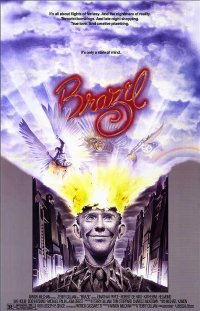
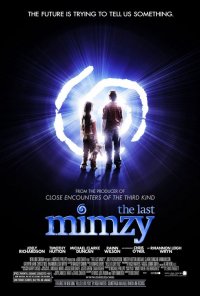
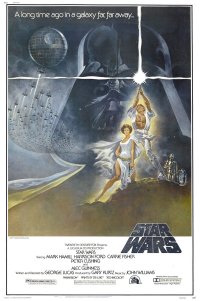
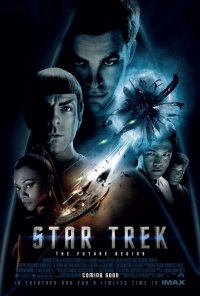


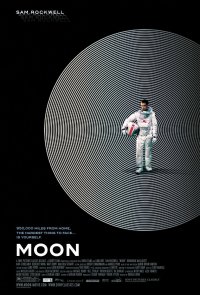
 First, an apology. Though I have been reading science fiction since I was fourteen, my exposure to science fiction
concepts came not from books but from movies and television. I suspect that I am not alone in this: most members
of my generation likely grew up not on issues of Astounding and Galaxy but
on syndicated episodes of Star Trek and The Twilight Zone. Many of us probably spent
hours standing in line to catch a showing of the original Star Wars and The Empire Strikes Back at
about the time we began reading original science fiction paperbacks and Omni magazine. As one of
the first generations that grew up with television a commonplace feature in our lives, it would of course stand
to reason that C-3PO and James Tiberius Kirk would be more familiar to us than
Isaac Asimov's robot R. Daneel Olivaw (from The Caves of Steel)
and Samuel R. Delany's Lorq Von Ray (from Nova).
First, an apology. Though I have been reading science fiction since I was fourteen, my exposure to science fiction
concepts came not from books but from movies and television. I suspect that I am not alone in this: most members
of my generation likely grew up not on issues of Astounding and Galaxy but
on syndicated episodes of Star Trek and The Twilight Zone. Many of us probably spent
hours standing in line to catch a showing of the original Star Wars and The Empire Strikes Back at
about the time we began reading original science fiction paperbacks and Omni magazine. As one of
the first generations that grew up with television a commonplace feature in our lives, it would of course stand
to reason that C-3PO and James Tiberius Kirk would be more familiar to us than
Isaac Asimov's robot R. Daneel Olivaw (from The Caves of Steel)
and Samuel R. Delany's Lorq Von Ray (from Nova).
 And they make money. Lots of it. I used to think that part of the reason was the lack of genre education on
the part of movie audiences, but in truth the problem is not limited to science fiction. No, I think the real
issue is that too many science fiction fans -- and I count myself among them -- are willing to sit through
mediocrity in order to view a nugget of wonder.
And they make money. Lots of it. I used to think that part of the reason was the lack of genre education on
the part of movie audiences, but in truth the problem is not limited to science fiction. No, I think the real
issue is that too many science fiction fans -- and I count myself among them -- are willing to sit through
mediocrity in order to view a nugget of wonder.